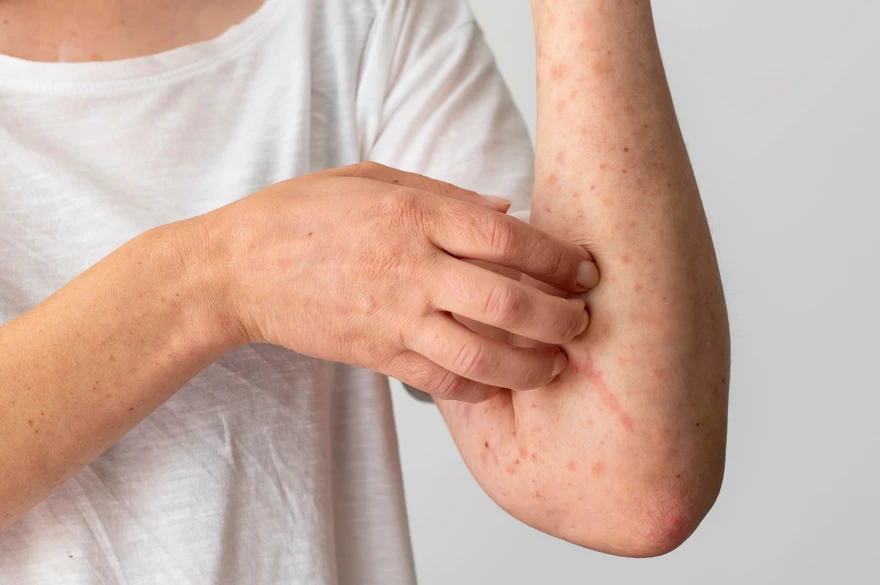Allergy Phadiatop Test - Screening IgE With (Adult & >5y)
53+ booked in last 3 daysAllergy Screening Test Overview
An allergy is a hypersensitivity disorder of the immune system that causes undesirable reactions to certain substances like food, dust, pollen, drugs or even animal dander. These reactions normally do not occur in others. The substance causing the reaction is an allergen. Immunoglobin E is an antibody that the body produces in case of an allergic reaction. Total IgE test is a blood test used to measure the complete IgE levels in the blood, but it does not indicate what is the specific allergen causing the reaction. Phadiotop is an allergy screening test that uses ImmunoCAP with comprehensive inhalant allergens like pollen, animal dander, grass, weed etc. It is a highly specific and sensitive test for detecting inhalant allergies. It differentiates atopic from non-atopic cases.
What is an allergy?
An allergy is a hypersensitivity disorder of the immune system. It causes an undesired reaction to harmless substances like food, drugs, pollen, dust or animal dander. These allergic reactions are not common to every person.
When an allergen (allergy-causing substance) enters the body, the immune system produces immunoglobulin IgE antibodies. These are produced to fight foreign substances. These antibodies trigger the release of histamines from the mast cells present in the skin, lining of the intestine, air passage, etc. This causes allergic symptoms.
What is an allergy phadiatop test?
Phadiotop is an excellent allergy screening test. It helps to detect inhalant allergens. It uses an ImmunoCAP with a balanced mixture of inhalant allergens present in the air. These allergens could be dust, pollen, animal dander, mould, grass, weed etc. This test is a highly specific and sensitive test. It is used for detecting allergies caused by allergens present in the air.
The phadiotop test measures the IgE-mediated response to inhalant allergens. It differentiates atopic from non-atopic cases. Further tests for a specific allergen will help in further diagnosis.
When is an allergy phadiatop test performed?
An allergy phadiatop test is performed in the following situations:
- To confirm the allergen causing the allergy.
- The test does not access the sensitivity to food, drugs or other substances. It is highly specific to inhalant allergens.
- To know the root cause of allergy that can help distinguishes atopic from non-atopic allergy and provide an allergen-specific treatment.
- Identifying the allergen can help reduce further exposure to them and prevent allergies.
When is an allergy phadiatop test performed?
An allergy phadiatop test is performed in cases of suspected inhalant allergies. The common symptoms are:
- Sneezing
- Runny nose
- Itching
- Diarrhoea
- Hives
In some cases, severe symptoms may also lead to anaphylactic shock. We should consult the doctor if we experience allergic symptoms very often. Untreated allergies may get worse with time. Once the allergen-causing allergic symptoms are known, it is possible to minimise or even eliminate the exposure to such allergens.
Written by: Dr.Shibani R, Medical Writer, Medical Affairs
Allergy Phadiatop Test - Screening IgE With (Adult & >5y) Price
Metropolis Healthcare is a leading diagnostics centre and pathology lab in India equipped with the latest state-of-the-art technologies that provides the Allergy Phadiatop Test - Screening IgE With (Adult & >5y) with a clear pricing structure.
The Allergy Phadiatop Test - Screening IgE With (Adult & >5y) Price in Mumbai is ₹ 1,750 .
We are committed to deliver accurate and quality results from the best labs in India with complete transparency regarding test cost and turnaround time. No matter where you are, we strive to offer patients high-quality service that is affordable and accessible.
Frequently Asked Questions
Allergy screening test may also be done in cases of suspected inhalant allergies for further diagnosis. The common symptoms are:
- Itching
- Running nose, sneezing, coughing
- Diarrhoea
- Hives
Certain severe cases may also lead to anaphylactic shock.
The test is used to screen for possible allergies due to pollen, animal dander, trees, grass, weed, mite, insects etc.
Based on these results further specific testing is recommended.
Allergy screening test measures the IgE mediated response to allergens. Further tests to a specific allergen will help in further diagnosis.
Allergy screening test requires a blood sample. A tourniquet (elastic) band is placed tightly on the upper arm. The patient is then asked to make a fist. This helps in the build-up of blood filling the veins. The skin is disinfected before needle insertion and the blood sample is collected in vacutainer.
Positive result indicates presence of an atopic allergy to inhalants. Increased IgE levels indicate that the body is allergic to something. What is the exact source of allergy (allergen) will require further specific testing for the allergen. Based on the symptom, age, environmental allergens, and region wise allergens further testing may be required for specific diagnosis.
Negative result may require other tests for differential diagnosis.
Runny nose, sneezing, cough, skin rash, vomiting, and diarrhoea are some of the signs of allergy.
Severe allergic reactions are called anaphylaxis. The symptoms include troubled breathing, increased and irregular heartbeat, loss of consciousness, swelling of tongue, throat, etc.
Any substance present in the air that can trigger allergic reactions in the body is called an inhalant allergen. These include dust, pollen, animal dander, grass, weed, etc.
An allergy phadiatop test requires a blood sample. A tourniquet (elastic) band is placed tightly on the upper arm. The patient is asked to make a fist. This enables the blood to build up in the veins. The skin is disinfected before the needle insertion. Then the blood sample is collected in a vacutainer.
A positive result indicates the presence of an atopic allergy to allergens present in the air. Increased IgE levels indicate that the body is allergic to some allergen. To know the exact source of the allergen that is causing the allergy, the healthcare provider will recommend further specific testing for the allergen.
However, a negative result may require other tests for differential diagnosis.
No, the total IgE test cannot detect specific allergens. To know the exact allergen-causing allergic reaction, an allergen-specific test should be performed.
There is no special preparation to undergo an allergy phadiatop test. A person should inform the doctor about all the currently used medications.
Yes, antihistamines can give a false result. Anti-histamines can reduce the allergic reaction. This makes it difficult to identify the allergen that is causing an allergy in a person.
Yes, certain medications such as penicillin, aspirin, and ibuprofen can cause allergies in some people. It is important to inform the healthcare provider about the medications a person is allergic to. They should avoid using them in the future.
The normal value of this test is >100kU/l.
Allergies lead to inflammation of the lungs. This can cause coughing, troubled breathing and wheezing.
The common inhaled allergens in asthma include dust, pollen, mold and animal dander. These allergens trigger the immune system. This activates the mast cells present in the airways. These could be chest tightness and difficulty breathing.
References:
1.https://www.apollo247.com/lab-tests/allergy-screen-includes-total-ige-and-phadiatop
2.https://www.lybrate.com/lab-test/allergy-phadia-top-adults
3.https://www.verywellhealth.com/inhalant-allergies-5206287
4.https://www.mayocliniclabs.com/api/sitecore/TestCatalog/DownloadTestCatalog?testId=57580
Allergy phadiatop test
Phadiatop test
Allergy IgE Screening Test
Ratings & Reviews (0)
Why Metropolis?
Metropolis has a team of 200 senior pathologists and over 2000 technicians delivering diagnostic solutions in the areas of routine, semi specialty and super specialty domains like Oncology, Neurology, Gynaecology, Nephrology and many more.
We offer a comprehensive range of 4000+ clinical laboratory tests and profiles, which are used for prediction, early detection, diagnostic screening, confirmation and/or monitoring of the disease.



.png)

















 WhatsApp
WhatsApp